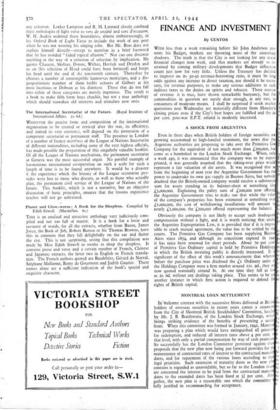FINANCE AND INVESTMENT
By CUS'FOS
WITH less than a week remaining before Sir John Anderson pre- sents his Budget, markets are throwing more of the customary shadows. The truth is that the City is not looking for any major financial changes next week, and that markets are already so re. strained by coming military developments that Budget influences count just now for very little. Unless the Treasury has decided to improve on its 50-50 revenue-borrowing ratio, it must be long odds against any increase in direct taxation, nor should it be neces- sary, for revenue purposes, to make any serious additions to such indirect taxes as the duties on spirits and tobacco. These sources of revenue it is true, have shown remarkable buoyancy, but the commodities in question are surely dear enough, at any rate, to consumers of moderate means. I shall be surprised if stock market quotations next Wednesday are materially different from Monday's closing prices even if the City's best hopes are fulfilled and the zo per cent. post-war E.P.T. refund is modestly increased.
A SHOCK FROM ARGENTINA Even in these days when British holders of foreign securities are growing accustomed to high-handed treatment, the news that the Argentine authorities are proposing to take over the Primitiva Gas Company for the equivalent of not much more than £200,000, has come as a bombshell to the London Stock Exchange. When, only a week ago, it was announced that the company was to be expro- priated, it was generally assumed that the taking-over price would represent a fair valuation of the assets. It was recognised that as from the beginning of next year the Argentine Government has the power to undertake its own gas supply in Buenos Aires, but nobody doubted that the British-owned company would receive a substantia sum for assets standing in its balance-sheet at something lik L5,000,000. Explaining the paltry sum of £200,000 now offer- the Argentine Government tries to make out that while the valu of the company's properties has been estimated at something ov £1,000,000, the cost of withdrawing installations will amount nearly £ t,000,000, the '£200,000 offered representing the balance.
Obviously the company is not likely to accept such inadequa compensation without a fight, and it is worth noticing that and the Argentine Expropriation Law, it is provided that if it is imps' sible to reach mutual agreement, the value has to be settled by th• courts. The .Primitiva Gas Company has been supplying Buen' Aires since 1854, and although its concession expired ih 1940 it has since been renewed for short periods. About 70 per cent of Primitive Gas Ordinary capital is held by Primitiva Holding in which the British investing public is directly interested. It 0 significant- of the effect of this week's announcement that whereat before the purchase price was disclosed the Li Ordinary units the Holdings Company were a firm market around ris. 9d., they ar now quoted nominally around 8s. At one time they fell as lo as 2S. 6d. without any dealings taking place. This seems to be y another instance in which firm action is required to defend th rights of British capital.
MONTREAL LOAN SETTLEMENT
InstVelcome contrast with the successive blows delivered at Briti holders of overseas securities in recent years comes a statem from the City of Montreal British Stockholders' Committee, head by Mr. J. B. Braithwaite, of the London Stock Exchange, win• brings striking evidence of the benefits of presenting a unit front. When this committee was formed in January, 1942, Montr was preparing a plan which would have extinguished all prioriti for redemption, and reduced all interest rates above 4 per cent. t that level, with only a partial compensation by way of cash premi So successfully has the London Committee protested against th proposals that the new plan now being put forward provides for maintenance of contractual rates of interest to the contractual maturi dates, and for repayment of the various loans according to th legal priorities. Such extension of maturity dates as the new P1 contains is regarded as unavoidable, but so far as the London issu are concerned the interest to be paid from the contractual maturi dates to the extended dates has been fixed at 31- per cent. Alt gether, the new plan is a reasonable one which the committee fully justified in recommending for acceptance.
to at
11:


























 Previous page
Previous page